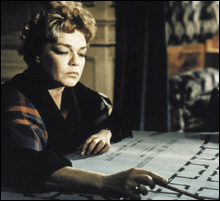|

MASTERMIND: Simone Signoret brings tragic weight to bear on the film’s precise naturalistic detail.
|
It now seems absurd that when Jean-Pierre Melville released L’armée des ombres|Army of Shadows, his tense, admirable 1969 film about the Occupation and the French Resistance, the political climate of post–May ’68 France caused its point of view to be condemned as “Gaullist” — reactionary. It’s almost as foolish that Melville, whose 1955 gangster picture Bob le flambeur anticipated the French New Wave, continued to represent for those filmmakers the old-fashioned studio-bound movies they wanted to break away from. So L’armée des ombres was dismissed and forgotten and only now is receiving US release.
Other Resistance dramas from Casablanca onward have emphasized the romance and the adventure of courageous men and women waging clandestine battles against the Nazis. L’armée des ombres is grim and fatalistic, its point of view existential. The small band of patriots at the center of Melville’s film, which is set in 1942 and 1943, accept the reality that none of them is likely to survive. Yet they carry out their missions, slipping across the border into free (though embattled) England, staging rescue operations when anyone blows his or her cover and winds up in a Nazi prison, eliminating the reluctant Judases among them because that’s their obligation even when they understand all too well how the Nazis managed to squeeze information out of them. There’s no glory in their work, only the conviction that their cause is right and existence under Nazi rule intolerable. Rarely has the phrase “eyes on the prize” seemed more apt.
Most of the story is told from the perspective of Philippe Gerbier (Lino Ventura), who captains most of the missions. In the opening few minutes, he’s incarcerated in a wartime prison along with a motley collection of men imagined to be threats to the Vichy government, then escapes when he’s brought in for Gestapo questioning. But in order to cover all aspects of his narrative, Melville shifts briefly to the point of view of the handsome young adventurer Jean-François Jardie (Jean-Pierre Cassel), who’s recruited into the Resistance by his friend Félix (Paul Crauchet) and then sacrifices everything in a desperate effort to save Félix from death at the hands of Nazi torturers. Jean-François fakes cowardice to get off Gerbier’s radar, then gets himself arrested so he can warn Félix that the others are working to rescue him. His fate is a bitter irony; so is his failure to learn that his own beloved brother Luc (Paul Meurisse), a famous mathematician whom he thinks of as cheerfully remote from this secret war, is Gerbier’s chief.
Melville gathers a first-rate ensemble, each one expressive in a spare, muted style; Cassel is especially fine. The others in the band are Le Masque (Claude Mann), whom we first encounter when he’s saddled with the difficult killing of a young man (Alain Libolt) branded as a traitor; the sturdy, loyal Bison (Christian Barbier); and Mathilde (Simone Signoret), who masterminds their escapades. Signoret gets a sensational moment in her last scene; it’s smart of Melville to move from irony to tragedy in the playing out of her character, since she’s one of the world’s great actresses, capable of bringing tragic weight to bear on precise naturalistic detail. L’armée des ombres is a sort of Resistance epic, but it takes place in a strangely depopulated France where everyone we see is either a Nazi or a Resistance fighter. This gives the title a special frisson. You get the sense that until the war is won and light returns to France, only ghosts hover over her — the emissaries of the death-serving Third Reich on the one hand, and on the other doomed heroes battling on until the darkness claims them.